Performance
Before getting into our testing, I did toss the P400 into CrystalDiskMark. This was just to confirm that the drive was connected at PCIe 4.0 x4 which it was. We can also see the firmware version which is 1.1A.

My first round of testing was to run the P400 through CrystalDiskMark. I wanted to check out Patriots claims in their specifications which referenced CrystalDiskMark specifically and these are also what a lot of people get most excited about. I have the numbers split up between read and write performance and I also marked the PCIe 3.0 drives blue and new PCIe 4.0 drives in orange for reference. The P400 was basically spot-on for its read performance sitting at 5036 MB/s. This was lower than some of the more recent PCIe 4.0 SSDs tested with just two drives coming in slower. It did however do better than some of those faster drives with the smaller file sizes. For the write results, it was once again right over the listed speed at 4813 MB/s. This was much better than the Rocket Q4 and the older MP600 but even more behind drives like the P5 Plus, FURY Renegade, and the Rocket 4.0 Plus all of which also had a ram cache.
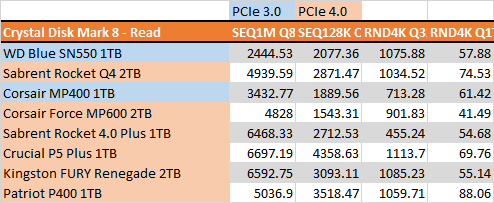
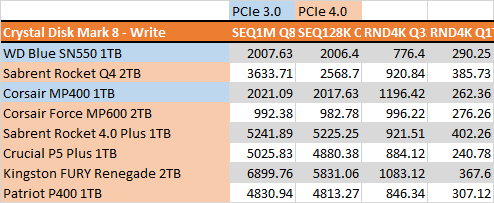
While testing in CrystalDiskMark 8 I did also check out the drive’s IOPS performance with the random 4k queue depth of 32 and 1 thread results. I stacked the read and write performance together here because I do believe that the overall drive performance is important, not just one result or the other. The P400 doesn’t outperform drives like the P5 Plus and the Renegade, but on the read side of things at least it wasn’t too far off. The write IOPS in this situation however hurt the total picture with it running in line with the PCIe 3.0 drives when you consider the combination of both aspects.

My next test was in AS SSD, but because the standard test in AS SSD is very similar to the CrystalDiskMark tests I prefer to check out one of its sub-tests, the copy benchmark. This moves three files, one that is an ISO, one that is a program, and then a game and times how long each takes. With these being timed, lower is better here. I have all three results stacked to see which drives are best overall. The Patriot P400 was the fastest drive tested in this test. Most of that came from the program file transfers but it was the fastest ISO and near the fastest on the game files as well.

Next up with PassMark Performance Test 10 I ran their combined synthetic benchmark to get a look at their DiskMark rating. The P400 did reasonably well here, falling behind the P5 Plus and the Renegade but still ahead of four other PCIe 4.0 drives.

Next up I have another look at IOPS, this time though it is when testing with Anvil’s Storage Utilities. This time at 4k with a lower queue depth of 16. Here the Patriot P400 topped the chart with its 4K QD16 Read IOPS. But the write IOPS were behind the Renegade and P5 Plus which when combined together put the P400 near the P5 Plus but behind the Renegade.

Sticking with Anvil’s Storage Utilities I did a few more tests. Here I wanted to check out how the drive would react to different queue depths so with the file size set to 4K I ran tests ramping up double each time starting at 1 and up to 128 for reads and 64 for writes. This lets us see if the controller gets overloaded. For the read queue depth tests the P400 did extremely well, coming in first from the start and stayed there all the way to the top running just slightly ahead of the Fury Renegade. Then for the write queue depth test it was in the middle of the pack at the start but did continue to climb when most other drives dropped off at a queue depth of 8. Overall it came in just behind the P5 Plus with the Renegade still way out ahead.

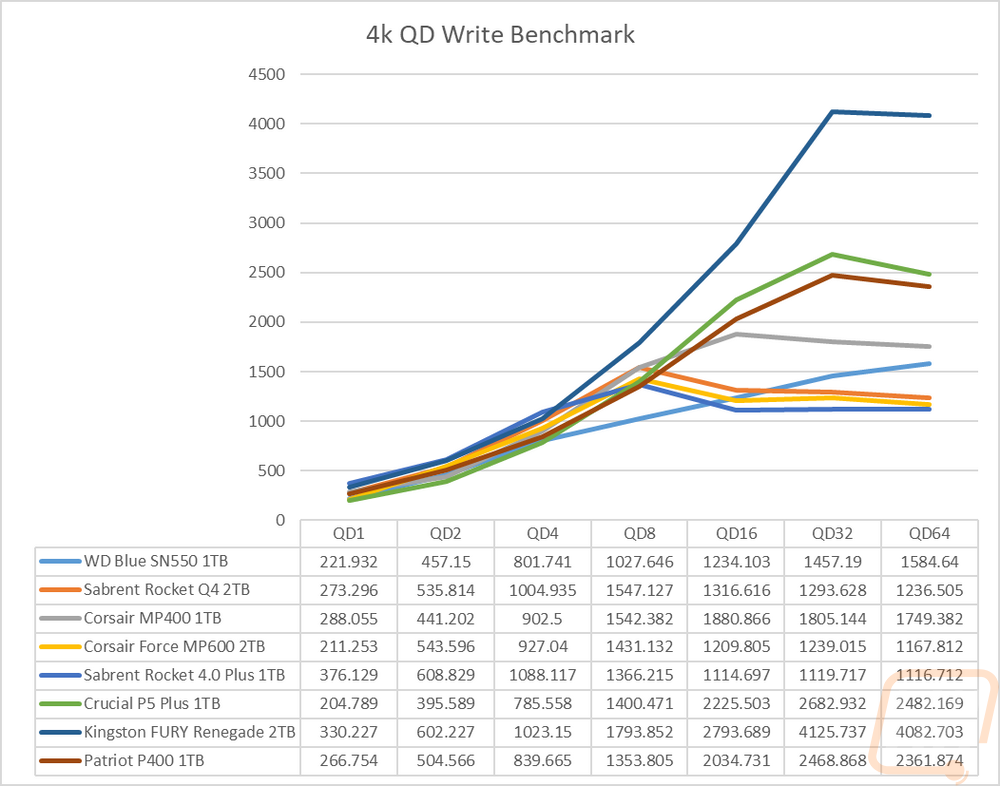
This next test is new in our test suite. I used ATTO Benchmark set to a queue depth of just 1 but ramped up the file size slowly to see how it would affect performance. For the read test in ATTO, the P400 was right with and a little ahead of the other drives in the lower file sizes which is something we have seen in some of the other tests. At 256KB it hiccuped and dropped down with the WD Blue SN550 but then found its way again and stayed in the middle of the pack peaking around 4200 MB/s from 8MB up to 64MB in file sizes. For the write test, it stayed with the competition up until 128KB where it leveled off and then dropped down slightly staying in the 4300 MB/s range from 2MB on up.
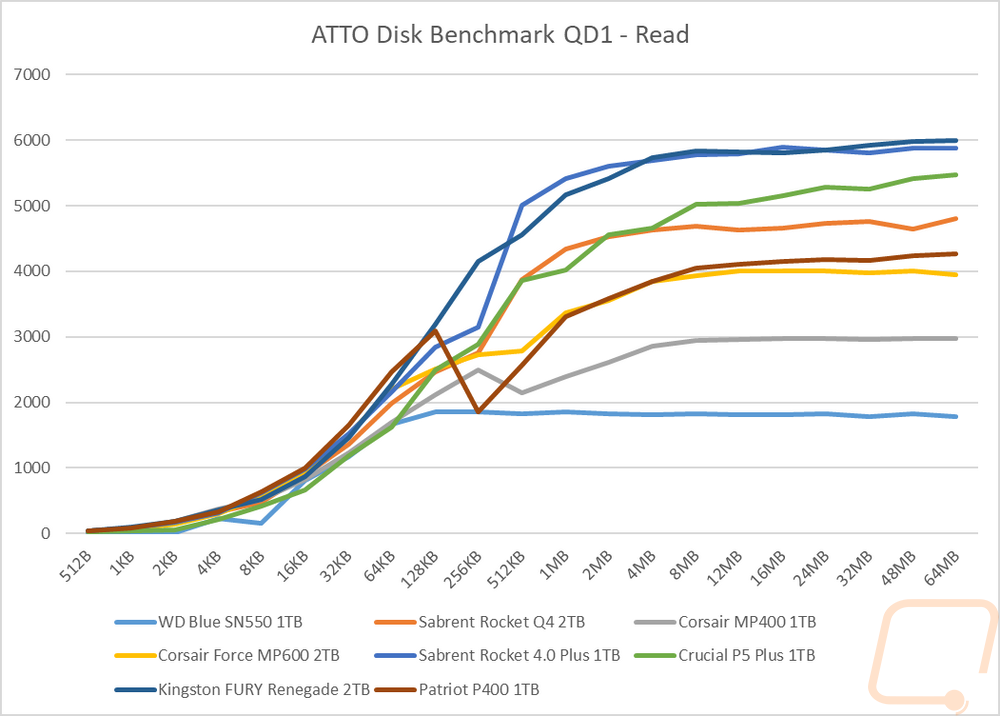
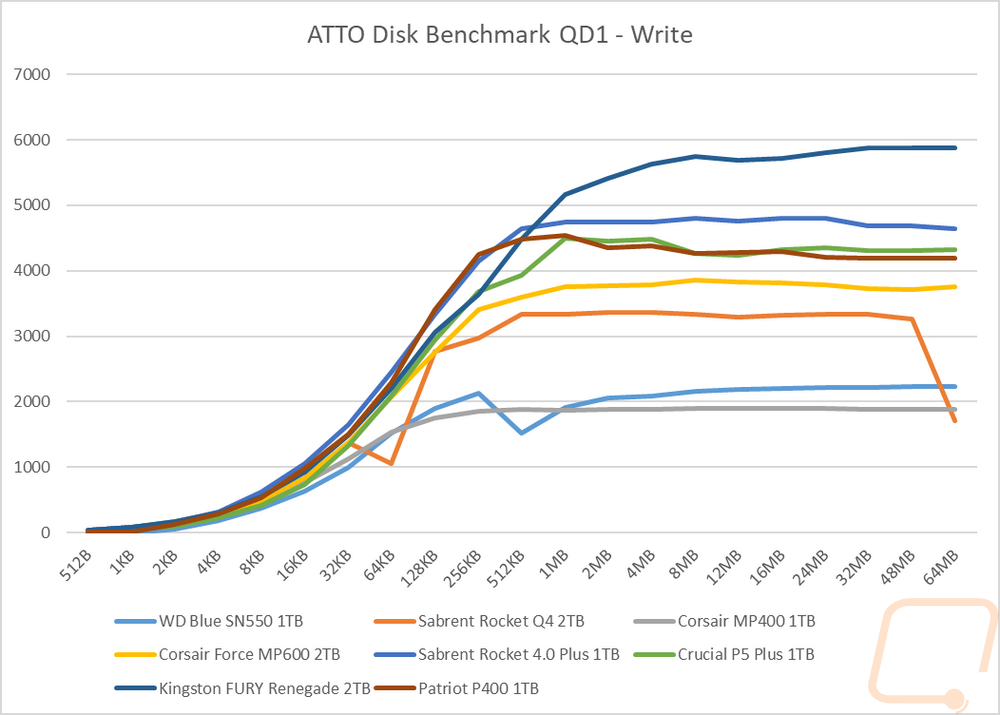
Next up I wanted to look at more real-world performance and for this, I started with PCMark 10 which has an overall full system benchmark for storage and then one focused on data storage drives. In the full system drive benchmark, the P400 came in right with the Rocket 4.0 Plus and behind the Renegade and P5 Plus. Then for the Data Drive Benchmark, it did much worse with just one drive coming in lower.
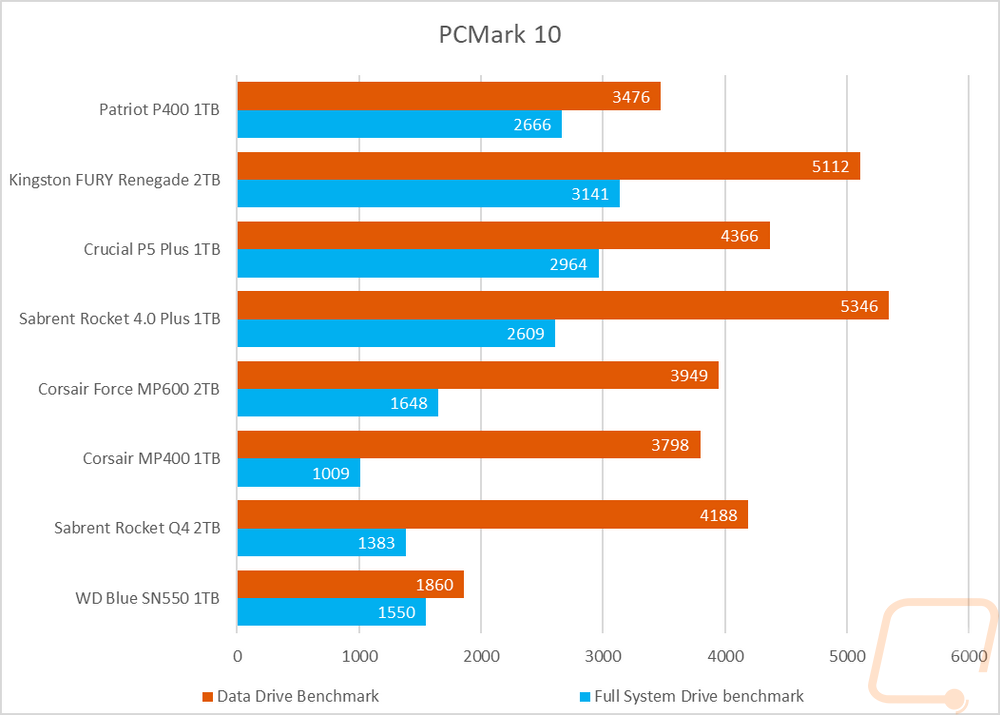
Next, up for more real-world resting, I did our file transfer tests. You don’t get any more real-world than this. For each drive, I copied the folder filled with files to the drive tested and then back to the Rocket Q4 in our test bench. I used three file types, movies which are large single files, a folder filled with RAW and JPG photos, and then a folder filled with word documents. The P400 performed similarly to the P5 Plus for the movie tests which had the Renegade and an older PCIe 3.0 drive at the top of that chart. It was a little behind with the medium file sized pictures. Then for the small document files, it out-performed the Renegade but overall was in the middle of the pack.
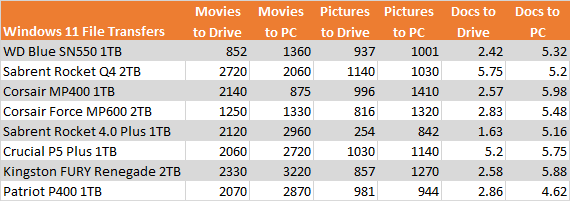
Last up I did take a look at the overall thermals of the Patriot P400. For this I used out Flir and to heat things up I ran AIDA64’s disk benchmark with a linear read for 20 minutes. The P400 installs upside down in this location on our motherboard, so the thin heatspreader was facing down and we have to look at the heat that is going through the PCB. It does tell us that most of the heat is all on the one end and near the top of the controller. The two NAND stay cool as does the rest of the drive.



